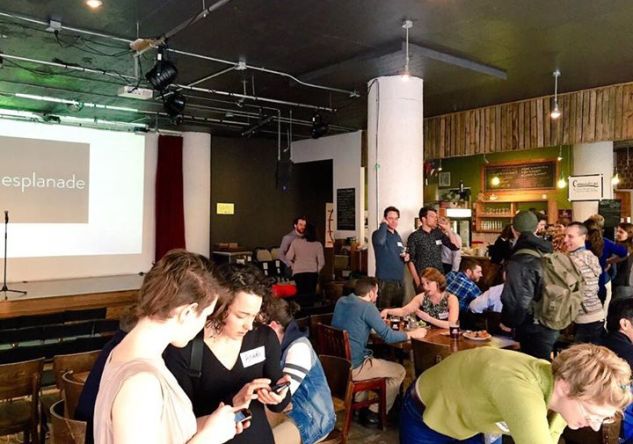
In April, Montreal’s first social entrepreneurship hub, Esplanade, opened its doors. The 11,000 square-foot space, located in the booming Mile-Ex district, is a co-working space, a social enterprise incubator and accelerator, and a meeting place for anyone who wishes to start a social business or to finance one, or simply wants find out what a social enterprise is all about.
“We plan on being very inclusive,” says Samuel Gervais, l’Esplanade’s general manager. “We invite traditional businesses to rent co-working space for their employees in order for them to work there a few hours every week. They get to feel the vibe, talk to our social entrepreneurs at the water cooler. This is how projects, and progress, will happen. Otherwise, if it remains a side-track, the concept of social entrepreneurship will reach a plateau.”
For decades, Quebec has had a strong tradition of social economy, but social entrepreneurship has a shorter history in the province. The impulse to grow the ecosystem came from l’Institut du Nouveau-Monde (INM), an NGO that focuses on citizen participation. INM launched a program called “À go on change le monde” (“Ready, set, go, let’s change the world”), an incubator for social innovation. At that time, INM wanted to take social innovation to the next level by offering the community a hub. This is how l’Esplanade was born.
It took two years to make it happen. “We started with a market survey,” says Gervais. “We wanted to verify that there was a real need for our hub, and if there were other projects like ours out there. That is how we discovered Salon 1861, another social enterprise hub created by social entrepreneur Natalie Volland. Our projects are complementary, so we collaborate.”
Natalie Volland is the CEO of Immeubles Quo Vadis, a rare breed of real estate promoters that work on social enterprise initiatives. Salon 1861 will open next summer in Montreal’s La Petite-Bourgogne district. It is located in an old church.
“You have to do a lot of surveys and networking in order to identify the members of the social enterprise community before you can start renting or building any space. Otherwise, your hub will be empty. You need to build traction first,” says Gervais.
Where do you start? “We covered all the angles, you have to. We worked with the economic development community, the foundations, the impact-investing community, the academic world and the co-working community. All these pillars were crucial to the success of our hub.”
L’Esplanade saw no need to reinvent the wheel. Quebec has many programs to help entrepreneurs. The point was to make sure these programs would acknowledge the unique nature of social entrepreneurs and understand their business models.
As for the academic world, many professors who teach and research the social enterprise phenomenon would welcome a hub where they could meet with members of the community and nourish their research. And lots of students are interested in social entrepreneurship, either as a way of life or as a way of making a contribution. Hubs like l’Esplanade need their energy.
Some foundations have identified social innovation as a target for their investments. L’Esplanade is financed by Silver Dollar, Bombardier, and Saputo. It also works with the McConnell Family Foundation.
Finding investors can be quite challenging. “You have to reach out to the impact-investing community,” says Gervais. “You have to network… a lot. More and more financial institutions have impact-investing funds. If you start there, it could be easier to get introduced to impact investors.”
L’Esplanade’s growth strategy includes strong national and international connections to other hubs. “We made contact with hubs and social enterprise organizations in Canada and Europe. We work closely with MaRS, in Toronto, and we are part of Virgin Unite. We also have ties with Canadian co-working associations, such as Coworking Ontario. They helped us develop a health insurance package we will offer to our tenants.”
L’Esplanade’s plans for next year include industry specific initiatives. “We’re inspired by Vancouver and Toronto’s experiences. We want to add sector-focused accelerator programs, aside from our general program. We are targeting smart city and food security startups, for example.”
Visit Esplanade website (in French): http://esplanademtl.instapage.com/
Original article by Diane Berard.






